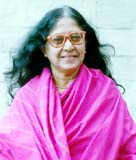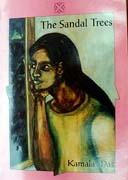The Rediff Interview/Kamala Das
'Manipulation is not a bad word all the time'
 Kamala Das has always been daring and forthright.
Kamala Das has always been daring and forthright.
She has criticised the tradition-bound, conservative society
which, of course, was always harsh on her unconventional life style.
One thing is sure: She was far ahead of many other Indian
writers in her ideas, unconcerned about
what others thought of her.
Excerpts from an hour-long
interview with Shobha Warrier.
Ladies and gentlemen, Kamala Das in inimitable style!
You expressed your feelings through different media -- poetry,
short stories, painting. Can we categories these as different
faces of a woman, or the different roles that she has to don,
like that of a wife, mother, lover etc?
I think it is very difficult to separate any person. A person
is the sum total of her experiences. I went on experimenting with
painting, poetry, fiction, drama. I am also a columnist. I think
I have become a professional writer as it is difficult remaining
a poet because poetry doesn't sell in this country.
I have to become a columnist to survive. It has been quite a hard life for
me. That must have helped me survive and to keep myself afloat.
I don't have any regrets. Some people felt I should have
concentrated upon one single medium.
You don't think so?
I don't think so. It would have bored me. I wanted to fill
my life with as many experiences as I can manage to garner because
I do not believe that one can get born again. So I want to experience
everything right here, be a painter, be a poet, be a good friend,
be a good mother.
Do you think differently when you are a poet, a columnist and
a painter? Your poems are so much different from your short stories,
and your paintings are different from your columns. Sometimes
one feels they are not done by the same person at all.
To become a columnist, I had
to gain some kind of a reputation as a writer because no newspaper would come forward and offer the job unless they know what
the author is capable of. You have to let them have faith in your
capabilities. So, I think some years of maturing is necessary
to become a columnist. Then, I suppose it is like standing for
an election. If you are sure, you can have a following, you get
votes, you stand for elections.
I think if you are assured of a wide readership, you can start writing a
column as you can start being a social worker. Because an author can
manipulate the thoughts of her readers, her devoted readers at any rate.
Manipulation is not a bad word all the time.
You could give some kind of guidance
without getting directly involved with his or her unseen reader.
That is the way authors gather strength, strength to later go
in for social work, for politics. It hasn't been a bad life
although in the beginning I had problems.
Problems in what sense?
In the sense that I had the wrong gender for this occupation.
Because women were expected to confine themselves to the realm
of the kitchen and it was not a role entirely accepted by society.
A woman had to prove herself to be a good wife, a good mother,
before she could become anything else. And that meant years and
years of waiting.
That meant waiting till the graying years. I didn't have the time to
wait. I was impatient. So I started writing quite early in my life. And
perhaps I was lucky. My husband appreciated the fact that I was trying
to supplement the family income. So, he allowed me to write at night.
After all the chores were done, after I had fed the children, fed him, clearned up
the kitchen, I was allowed to sit awake and write till morning.
And that affected my health.
You said you were born in the wrong gender. Do you feel it
would have been easier for you as a writer, had you been a man?
Yes, I am sure. My mother's uncle was a writer, quite well
known too. Nalapat Narayana Menon. He had nothing else to do but
write and I have watched him work from morning till night. I think
that was a blissful life.
What about your mother? How did she manage to write so much?
Mother was given the chance to write, to be a full time writer.
It was easy for her because my father was a very old fashioned
gentleman, so he gave her plenty of servants to look after the
children, servants to look after the kitchen. She did not have
to do anything other than write. And I think she must have enjoyed
it. She brought out several books when she was young.
Do you remember, you once told me about the pathetic condition
of a woman writer who does not even have a writing table. The
dining table has to serve as her writing table once it is cleared.
I was thinking about the middle class woman who plans to become
a writer. I was talking about myself, of course. There was only
the kitchen table where I would cut vegetables, and after all
the plates and things were cleared, I would sit there and start
typing. That was my work area.
Work are normally would remind
you of the grinding stone, or the mixie or something, but in my
case, it was the typewriter and plenty of paper. Then I would
sit there for hours and hours while the house was asleep because
nights became my domain. I could find freedom only at night when
I could ignore my family and become an independent person. I felt
like myself only in the quiet hours of the night.
 Could you manage to perform all the roles together and distance
yourself away from all the trappings at night?
Could you manage to perform all the roles together and distance
yourself away from all the trappings at night?
I had to. I was a very emotional person, and I was attached
to my children and my husband although not in the conventional
way. But then I could forget, I could set it aside just like I
set aside the kitchen utensils and everything to make place for
writing. I could set aside everything and command an area for
myself that became my own arena where I could write stories and
stories and write columns too till the milkman's cycle clanked
besides my window.
Was it not very tiring for you to work so hard at night and
also during daytime as two different identities?
Yes, it was tiring. It really ruined my health. But a little
bad health has its compensations. Then, you can't go in for an
athletic kind of life but have to be tied to the home. If you
are tied to the home, you have to spend your time writing. I did
a lot of writing.
Photographs: Sanjay
|





 Kamala Das has always been daring and forthright.
Kamala Das has always been daring and forthright.
 Could you manage to perform all the roles together and distance
yourself away from all the trappings at night?
Could you manage to perform all the roles together and distance
yourself away from all the trappings at night?